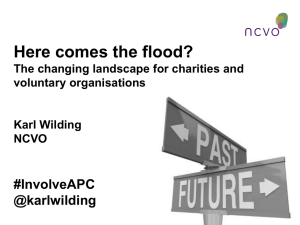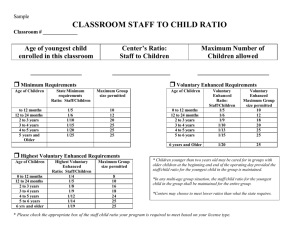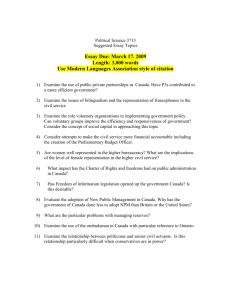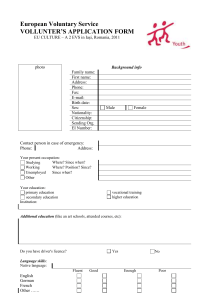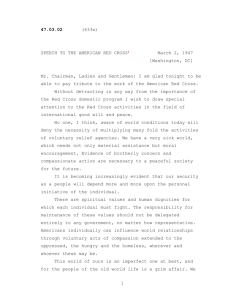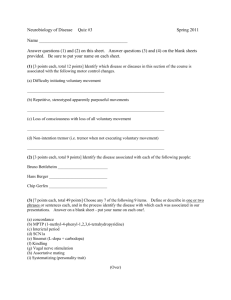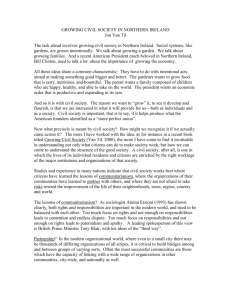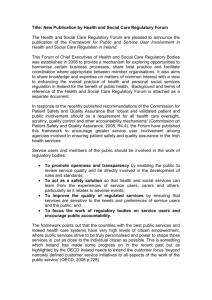final_version_concordat_annual_report_20132
advertisement
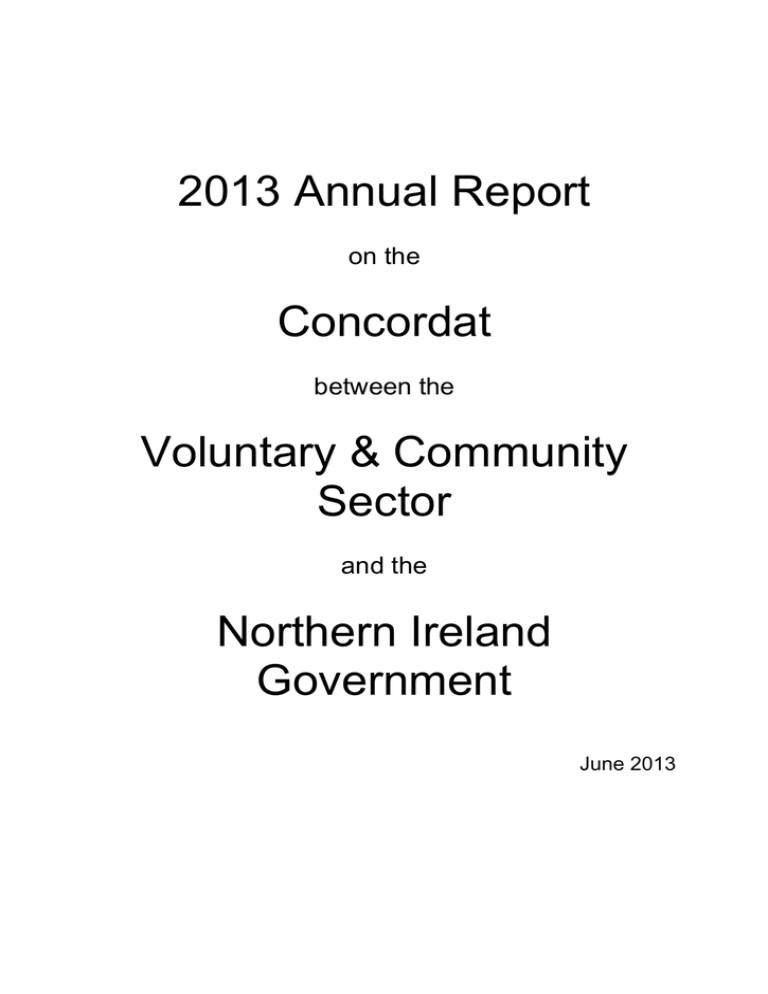
2013 Annual Report on the Concordat between the Voluntary & Community Sector and the Northern Ireland Government June 2013 Contents Page Joint Forum Chair Foreword 3 Executive Summary 6 1. Introduction 10 2. Key Issues Impacting on the Voluntary and Community Sector 11 3. Commitment Action Teams – Updates 13 Structural Reform 14 Outcome-Focused Approach to Funding 15 Influence and Examine the Impact of Government Policy 17 The Addressing Bureaucracy Project 18 Public Accounts Committee – Update 19 Recommendation 3 20 Recommendation 5 22 Recommendation 11 23 Moving forward 24 4. 5. Appendix A – List of Joint Forum organisations 2 26 Joint Forum Chair Foreword On behalf of the Joint Government/Voluntary and Community Sector Forum, we are pleased to present the second annual report on the Concordat between the Voluntary and Community Sector and the Northern Ireland Executive. Since its launch in June 2011 the Concordat has evolved from a written agreement between government and the Sector, to a fully operational working document. Significant progress has been made on a number of fronts: - a solid infrastructure is in place with a revised Joint Forum with new members who have a clear understanding of their roles and responsibilities; this new forum has established dedicated action teams and these teams have made significant progress on a number of complex issues; and working relationships between government and sector organisations have been strengthened. This year has seen major advances towards addressing complex, historical and institutionalised working procedures and issues that have previously seemed to be intractable. Attempts have been made in the past to address these matters but it has taken the new mindset and impetus within this Forum to start the process of breaking down barriers to progress and change. The development of key structures to enable the Concordat to become real and relevant to all partners was fundamental in establishing an effective Joint Forum to manage the work being taken forward. One of these structures was the development of dedicated project teams to look at the issues impacting the Sector. Achievements during the period covered by this report are highlighted below and detailed in the body of this report. We also report on the enthusiasm for government, sector and council representatives to work in partnership and the desire to expand this to encompass the wider public sector. 3 KEY ACHIEVEMENTS A modernised and streamlined infrastructure for Joint Forum with clear roles and responsibilities for members; Commitment Action Teams using formal programme management techniques to address specific issues impacting the Sector; Formal Joint Forum meetings 2-3 times per year with 40+ meetings between Commitment Action Team members and Joint Forum secretariats; New and existing public sector and voluntary and community sector working relationships established and strengthened and an enthusiasm for involving more public sector organisations; Strong links forged with other forums with similar professional interests with an exchange of membership; Development of a standardised monitoring mechanism to ensure good practice is maintained with government and sector interaction; Links established with the NICS wide Policy Champions Network; Joint training programme for government and voluntary and community sector policy makers under consideration; Engagement on the process of policy development and its impact; An ‘Addressing Bureaucracy’ project which has made nineteen recommendations aimed at reducing red-tape in the day to day business between government and the Sector; 4 Buy-in to a UK-wide programme of measuring the impact of the work of the Sector. Several of these issues are linked to recommendations made by the Northern Ireland Audit Office (NIAO)1 and the Public Accounts Committee 2012 (PAC)2. This report also provides an update of the progress made in relation to these recommendations. In addition, the Joint Forum has welcomed updates from the Social Security Agency on Welfare Reform and Department of Environment on the Reform of Local Government. This provided the opportunity to discuss these issues in greater detail. Having seen what can be achieved through partnership working, it is important that we capitalise on the advances made. The challenge will be in maintaining momentum and the same high level of commitment to achieving results that was demonstrated by those who have participated on Commitment Action Teams. The time investment was considerable but it has been reflected in the progress made on some very difficult issues. In recognition of this we are preparing a communication strategy to raise the profile of the Joint Forum and showcase its work and its successes and the closer working relationships being developed between the public and voluntary and community sectors. We believe that this Annual Report fully complies with the spirit and letter of the Concordat in that it provides a full and frank report of progress against commitments made by all participants and embodies the spirit of partnership working enshrined within the Concordat in its shared principles and values. Tracey Teague Anne O’Reilly Joint Forum Chair Voluntary & Community Unit Joint Forum Chair Voluntary Sector Group 1 ‘Creating Effective Partnerships between Government and the Voluntary and Community Sector in September’ 2010 2 ‘Creating Effective Partnerships between Government and the Voluntary and Community Sector January 2012’ 5 Executive Summary 1. The Concordat was developed to address the long-standing difficulties which were hindering positive and productive partnerships being established between the voluntary and statutory sectors. Since work commenced on the range of issues set out in the Commitment Programme the rate of progression towards resolving these difficulties has been significant, despite the complexity of some of the matters involved. 2. The framework of dedicated Commitment Action Teams, set up to take forward a number of prioritised commitments, has proved to be an effective approach of identifying core issues and proposing possible resolutions. Selecting team members from the government and the voluntary and community sector provides a complementary range of skills, knowledge and expertise; existing working relationships have strengthened and many new relationships have been established. 3. The review of the structure of the Joint Forum has been completed and its operation is well established. The smooth functioning of the new Joint Forum has greatly assisted the progress of achievement of the commitments through the management of the Commitment Action Teams (CATs). Of the four commitments prioritised by Joint Forum to be taken forward, two have been completed and significant advances have made with the others despite the complexity of the issues involved. The achievements of the four CATs are as follows. 6 Structural Reform 4. The Structural Reform team addressed three key issues: A review of the Terms of Reference and membership of the Joint Forum; Production of the Concordat Annual Report; Developing a tool to measure compliance with the shared values and principles of the Concordat. 5. All of these objectives have been achieved by this team: the success of the review of the Joint Forum is reflected in the progress made by the CATs as set out in the body of this report. The first Concordat Annual Report was produced to agreed timeline and production of this second Annual Report is also in line to meet agreed timelines for issue to the NI Executive and Assembly. A Compliance Tool to measure the degree and effectiveness of collaborative working has been developed by the team and will be piloted within the next few months. Outcome-Focused Approach to Funding 6. In the course of researching the issues relating to outcome-focused funding, the Commitment Action Team developed linkages with the Building Change Trust, an organisation which was set up to help develop and shape the future of Northern Ireland’s voluntary and community sector. Building Change Trust had already developed a project alongside the UK Inspiring Impact Programme which is an initiative aimed at changing the way government and the Voluntary and Community Sector consider outcome measurement. 7 7. Based on the UK project a 3 - 5 year Development Plan is being undertaken in partnership with the VCS, funders and impact practitioners. An impact-based, outcome-focused pilot is also being resourced by the Department for Social Development (DSD) in order to determine how effective this approach can be in terms of reducing bureaucracy and increasing the focus on delivery of project objectives. 8. Following detailed discussions with Building Change Trust and with Joint Forum agreement it was decided that this commitment would be best progressed by collaborating with the Building Change Trust. The Building Change Trust is due to report on their project later this year and the team will consider the findings in relation to their objectives. Influence and Examine the Impact of Government Policy 9. This Commitment Action Team has looked at the issues which prevent closer involvement of the Voluntary and Community Sector (VCS) in policy design and development. Following discussion at Joint Forum in February 2013 it was agreed that the CAT should look at four key objectives. Ensure future engagement with the NICS wide Policy Champions Network, which is pursuing a programme of work aimed at enhancing the capability of policy development and delivery across the NICS; Explore the opportunities for developing a joint training programme for government and voluntary and community sector policy makers; Develop an information booklet to guide policy makers and the general public through the policy development and consultation process. Explore the possibility of developing an Evaluation Tool. 8 10. Progress is being made on all four of these objectives including Joint Forum’s participation in round table discussions hosted by the Policy Champions Network which was looking at ways to deliver more effective engagement across all aspects of policy making; engagement with the Centre for Applied Learning (CAL) to discuss proposals for joint training; and development of a policy guidance booklet. The development of an evaluation tool will be progressed after the pilot exercise on the Compliance Tool has been completed. Tackling or Addressing Bureaucracy 11. A cross Departmental ‘Addressing Bureaucracy Project’ has produced a far reaching report which forms a sound basis to address the multiple issues relating to bureaucratic governance arrangements, whilst maintaining the integrity of the accounting process. This report makes nineteen recommendations which support the high level aims shared by government and the voluntary and community sector of delivering a high quality services that make a difference to society. 9 Introduction 1.1. This document is the second report from the Joint Government /Community Sector Forum (Joint Forum) on the Concordat between the Voluntary and Community Sector and the Northern Ireland Executive. 1.2. The Concordat contains an annual undertaking for the Minister for Social Development to formally present a report from the Joint Forum which provides an update on progress on issues impacting the voluntary and community sector to the NI Executive and Assembly. 1.3. While the Concordat represents the shared vision of government and the Voluntary and Community Sector, custodianship and responsibility for the implementation of the Commitment Programme lies with the Joint Forum. This group is responsible for ensuring that the shared values and principles of the Concordat are translated into tangible outcomes and positive progress in this social partner relationship. 1.4. It was recognised at the outset that the progression of some commitments would most likely be a long-term process and likely to require input from external sources. These circumstances have indeed arisen and additional resources have been put in place. 1.5. This report highlights how work on the priority commitments has been taken forward; how the primary issues have, in some cases, identified other matters to be addressed; and significantly, how relationships have developed between statutory and voluntary/community bodies. 10 2. Key issues impacting on the Voluntary and Community Sector Partnership for better outcomes 2.1 Voluntary and Community Sector members of the Joint Forum agree that the last twelve months have seen impressive progress across a number of issues. However, in the spirit of the mutual respect and partnership of the Concordat the voluntary and community sector group traditionally take the opportunity afforded by the Annual Report to highlight issues for on-going and future work. 2.2. As advocates for communities and families, voluntary and community organisations believe that by working in partnership with government we can achieve the best possible social, environmental and economic outcomes. The space for critical reflection and accountability must be an element of that partnership. Many organisations currently feel that while they participate in consultations in good faith, there is little evidence of their influence coming to bear. The voluntary and community sector repeats its call to foster a more productive relationship with government, which moves beyond consultation on what are often already decided policies, into a more connected, dynamic, problem solving and outcome-focused relationship. Mitigating the impact of austerity and welfare reform 2.3. Communities and families across Northern Ireland are facing the very real and very serious implications of both an economic policy based on deficit reduction at all costs and welfare reform. Voluntary and community organisations have never been in more demand and the sector recognises the limited scope of the Northern Ireland Executive in relation to these 11 issues. Voluntary and community organisations and government should put the values and spirit of the Concordat into action and work together to advance policies and programmes to mitigate the impact of austerity and welfare reform in Northern Ireland. The sector can provide a wealth of resources, expertise, access to people and communities and innovative ideas to help people and communities cope with the worst impacts of these policies. Spend based on need 2.4. Voluntary and community organisations support the principle that spend should follow need. Public policy and finance should be directed towards those who need it most and will benefit from it most. Vigilance should be maintained to ensure that spending pressures do not compound or invite new inequalities. These principles are more important now than ever and must be seen to be protected. 12 3. Commitment Action Teams (CAT) - Updates Introduction 3.2. The Commitments Programme within the Concordat document identified twelve areas which needed to be addressed in order to ensure the effective delivery of significant elements of the Concordat. To take the issues in these areas forward it was decided to allocate responsibility to dedicated project teams, now referred to as ‘Commitment Action Teams’ or CATs. 3.3. Establishing CATs has proven to be a very effective mechanism for achieving results. Teams comprising government, voluntary and community sector and council representatives have provided a diverse range of skills, and current team members have committed their time to the discussion, investigation and production of options to the issues they were allocated. 3.4. As these teams complete their allocated tasks new teams will be set up to take forward new Commitments, or to follow-up on proposals and recommendations from out-going teams. 3.5. Although anticipated, the depth and complexity of some commitments did not become fully apparent until the teams began to address the issues involved. The terms of reference and project initiation document for the Bureaucracy Team, for example, were revisited when the range and complexity of the issues involved were realised. This team expanded to become a working group with a structure comprising a Corporate Steering Group, Project Board and a Project Team. 13 Structural Reform The Structural Reform team was tasked with three objectives. 3.6. Objective 1: To formally present to the NI Executive and Assembly a yearly report from the Joint Forum through the DSD Minister on issues impacting on the Voluntary and Community Sector. This Concordat commitment has been achieved by the publication of this Annual Report. 3.7. Objective 2: To review the Terms of Reference and membership of the Joint Forum, which includes the Voluntary and Community Sector Panel3 and the Inter-Departmental Group4 to document this new agreement and emerging public sector structures and responsibilities. A review of the Terms of Reference and membership of the Joint Forum was concluded and presented to the NI Executive and Assembly in the first Annual Report June 2012. 3.8. Objective 3: To explore and develop processes whereby Concordat noncompliance can be addressed. A process to measure compliance with the principles and values of the Concordat has been designed to monitor the development, implementation, and impact of any new or revised policy. This process, or monitoring tool, is based on ‘The Agreement’ and ‘Shared Values and Principles’ sections in the Concordat. The tool has been designed to track the processes used when a policy or programme is under development and assess whether these processes 3 4 Renamed Voluntary Sector Group Renamed as Public Sector Group 14 comply with agreed procedures. Any deviation from the standard is reviewed to measure good and bad practice. It was agreed at Joint Forum that any outcome from measuring compliance would be viewed as an opportunity for learning and review. It is envisaged that this evaluation tool will be piloted to test its effectiveness in a ‘live’ situation. 3.9. The Structural Reform CAT has concluded their work on these objectives. Presentation of the yearly report on progress to the NI Executive and Assembly will be facilitated by the Voluntary and Community Unit. Outcome-focused Approach to Funding The terms of reference agreed for this CAT had identified five objectives: 3.10. Objective 1: To identify good practice models of outcome-related investment in the community/voluntary sector from statutory, charitable and philanthropic sources. 3.11. Objective 2: Identify best practice policy/legislation impacting positively on outcome-related investment within other jurisdictions. 3.12. Objective 3: Develop definitions which clearly distinguish the key differences in meaning and practice relating to outputs and outcomes. 3.13. Objective 4: Produce appropriate guidance material on how outcomefocused investment in the Community/Voluntary Sector is built into the various methods through which the Government Sector seeks applications, assesses, makes awards, monitors and evaluates related financial support. 15 3.14. Objective 5: Produce appropriate guidance material on how the Community and Voluntary Sector is expected to evidence outcomes delivered as a consequence of investment in the Sector by government. 3.15. Following preparation of an interim report in January 2012, the Concordat Action Team (CAT) taking forward work in relation to this commitment continued gathering information and meeting with relevant stakeholders. Following a presentation to the CAT by Building Change Trust (BCT), the Inspiring Impact Programme was identified as a better opportunity to progress this work. Inspiring Impact is a UK wide initiative aimed at changing the way the VCS thinks about impact, with a view to making impact measurement the norm across government and the VCS. Rather than produce its own final report, representatives from the CAT are now working with BCT with a view to developing and supporting the delivery of specific Inspiring Impact arrangements for Northern Ireland. Work is currently underway with the VCS, funders and impact practitioners to produce a 3-5 year Development Plan which takes account of the products from the Inspiring Impact Initiative. 3.16. In addition to this work, in accordance with Recommendation 15 in the Addressing Bureaucracy Report, DSD will pilot an impact-based (outcomes-focused) approach to grant funding to determine how effective this approach can be in terms of reducing bureaucracy and increasing the focus on delivery of project objectives. The Addressing Bureaucracy report was formally signed off by the Project Board and work is underway to develop the pilot. Progress will continue to be reported through the Joint Forum. 16 Influence and Examine the Impact of Government Policy 3.17. Objective: To provide opportunities for the Voluntary and Community Sector to influence and examine the impact of government policy. 3.18. This commitment has proven to be a difficult area from which to develop a clear direction of travel. Following discussion at Joint Forum of 7 February 2013 it was determined that the objectives should be: Production of a concise note on policy development signposting to useful contacts and various websites on policy making including the OFMDFM guide to good Policy making. Develop opportunities for a joint training course from Centre for Applied Learning/Voluntary and Community Sector; Ensure future engagement with the NICS wide Policy Champions Network, which is pursuing a programme of work aimed at enhancing the capability of policy development and delivery across the NICS; Developing an evaluation toolkit to assess the impact of government policy. 3.19. The Centre for Applied Learning (CAL) was approached to explore the feasibility of developing and delivering a training course specifically for the Voluntary and Community sector. These issues remain under discussion. 3.20. Anne O’Reilly recently represented the Joint Forum at a Round Table discussion on Effective Engagement hosted by the Policy Champions Network. The Joint Forum’s key message at this event reinforced the need for early and ongoing engagement throughout the policy making process 17 and this input continues to be reflected in the ongoing work of Policy Champions Network to develop more effective engagement guidelines for all policy makers. The Addressing Bureaucracy Project Background 3.21. One of the key issues arising from the Public Accounts Committee’s report was the need to address the issue of bureaucracy in grant funding to the Voluntary and Community Sector (VCS). Whilst disproportionate bureaucracy has been identified as a cross cutting issue for some time, the publication of the Committee’s report created a fresh impetus to tackle this issue. 3.22. DSD established a cross Departmental ‘Addressing Bureaucracy Project’ in March 2012 with a key objective ‘To identify improvements that can be made in public sector funding to the Voluntary and Community sector, which will deliver greater proportionality of administration, reduce duplication of effort or deliver better value for money’. Given the complex nature of this issue, senior representatives from the DFP, the NI Audit Office and the Voluntary and Community sector accepted key roles within the Steering Group and Project Board overseeing the work. 3.23. This work has now completed and a report ‘Addressing Bureaucracy: A report on tackling Bureaucracy in Government funding to the Voluntary and Community Sector’ has been produced. This report forms a sound basis to address the issue of bureaucracy whilst at the same time ensuring that appropriate governance arrangements are in place. The report has now been formally signed off by the Project Board and work to take forward the key recommendations and the important pilots identified, is now underway. 18 4. Public Accounts Committee – Update on Creating Effective Partnerships between Government and the Voluntary and Community Sector 4.1 The Public Accounts Committee met on 12 October 2011 to consider the Comptroller and Auditor General’s report on ‘Creating Effective Partnerships between Government and the Voluntary and Community Sector’ (NIAO Report) September 2010. The PAC Report made recommendations on: managing the relationship with the voluntary and community sector; the policy process; the Government Funders’ Database; support services and ICT strategies; and funding. 4.2. Following the presentation of evidence by DSD officials, the Committee made eleven recommendations, three of which are considered relevant for inclusion in this report. Detail contained within these recommendations and the current updated position is provided in this section of the report. 19 PAC Recommendation 3 “The Committee welcomes the plans to present an annual report to the Assembly on the working of the Concordat. The Committee recommends that this report includes: Information on concerns raised by funders and funded bodies and on the actions taken to address these.” Update 4.3. The current position on Concordat commitments has been included in the 2013 Concordat Annual Report. In addition to these issues presentations have been made to Joint Forum on: Reform of Local Government Welfare Reform Update on the Bureaucracy Project Update on the Belfast Community Investment Programme State of the Sector “Annual assurance statement on the operation of the Funders’ Database.” Update 4.4. All Departments have been asked to ensure that compliance with the Government Funding Database (GFD) is tested on a regular basis and that 20 assurance is provided through each Department’s Internal Audit work plan. 4.5. It is recommended that DSD work with DFP and other Departments to progress the use of the GFD to record public sector funding to the voluntary and community sector to promote across Departments and their Agencies. 4.6. PAC Recommendation 3 required public bodies to confirm the completeness and accuracy of the information held on the GFD. DSD is working across government through the Bureaucracy Project to promote the use of the GFD and is currently engaged with DFP to establish how best to achieve this. 4.7. Roll-out of the database outside central government departments commenced with five district councils in May 2012 followed by a series of DSD awareness sessions and training for the remaining Councils. Input of Council funding onto the database commenced in April 2013. DSD officials plan to engage with the Health Trusts and Education and Library Boards with a view to seeking their commitment to recording funding on the database. Discussions are also underway to explore how European Funding might be included. “The progress being made by the working groups established under the Concordat.” Update 4.8. See Section 3 above. 21 “Assurance that good practice guidance is being applied by all public sector bodies, in particular in relation to prompt payments, appointment of lead funders, proportionate monitoring and audit and focus on outcomes.” Update 4.9. All elements of the above Recommendation have been covered by the Addressing Bureaucracy Project team. PAC Recommendation 5 “The Committee recommends that greater emphasis is given to evaluating and demonstrating the outcomes being delivered by the Sector and the sustainability of sector organisations providing services. This will assist funders and the Sector itself to assess the quality and value of the work being done and ensure that scarce resources are properly targeted and used effectively. It is important that government and the Sector work collaboratively to develop output and outcome measures.” Update 4.10. This recommendation has also been listed a commitment within the Concordat and a Commitment Action Team was tasked with addressing this issue. In the course of researching this matter the team found that the Building Change Trust (BCT) was working towards a similar outcome using the Inspiring Impact Programme. Inspiring Impact is a UK wide initiative aimed at changing the way the VCS thinks about impact with a view to 22 making impact measurement the norm across government and the VCS and this programme was identified as a better opportunity to progress this issue. Rather than produce its own final report, it was agreed that the CAT would work with BCT with a view to developing and supporting the delivery of specific Inspiring Impact arrangements for Northern Ireland. Work is currently underway with the VCS, funders and impact practitioners to produce a 3 – 5 year Development Plan which takes account of the products from the Inspiring Impact Initiative. 4.11. An impact-based, outcome-focused pilot is also being launched by DSD to determine how effective this approach can be in terms of reducing bureaucracy and increasing the focus on delivery of project objectives. PAC Recommendation 11 “The Committee recommends that DSD reports, through the Joint Forum’s Annual Report to the Assembly, on the implementation of the priority functions contained in the Regional Infrastructure Support Programme." Update 4.12. DSD has successfully refreshed and introduced regional support arrangements which are designed to eliminate duplication, promote collaborative working and ensure quality of service with a greater focus on the outcomes to be achieved. In putting the new arrangements in place, DSD has worked collaboratively with other Departments where it was appropriate. 23 Progress to date includes: arrangements for generic support through the new Regional Infrastructure Support Programme - a new joint programme involving both DARD and DSD; regional thematic support for Voluntary Generalist Advice and FaithBased Engagement; continued work with groups representing Women in Disadvantaged and Rural Areas to create the necessary collaboration for support arrangements to work. 5. Moving forward 5.1 The foundations are in place and an effective Joint Forum, supported by Commitment Action Teams, is addressing long-standing issues impacting the voluntary and community sector. The first tranche of commitments are now either completed or at a stage where action is being taken to implement and/or trial the proposals and recommendations put forward by CATs, the PAC and NIAO. Progress on these matters will continue to be reported through the Annual Report. 5.2. The Joint Forum is preparing a programme of work for the incoming year taking account of work already in progress and identifying where the recommendations from the Bureaucracy, PAC and NIAO Reports overlap or duplicate actions identified in the Commitments Programme. 5.3. In addition to this, there is a need to publicise the Joint Forum and highlight the significance of its role as the gateway between the public and voluntary and community sectors. A communications strategy is already underway to establish a mechanism for the role of the Joint Forum and all aspects of its 24 work, progress and successes, to be shared with an audience which is much wider than those directly involved. 5.4. It is anticipated that this incoming year will see a consolidation of the Joint Forum’s work and an expansion of its role as the link between the Voluntary and Community Sector and the Northern Ireland Executive. 25 List of Joint Forum organisations. Appendix A Public Sector Group (PSG) Department of Agriculture and Rural Development (DARD) Department of Culture, Arts and Leisure (DCAL) Department of Education (DENI) Department for Employment and Learning (DEL) Department of Enterprise, Trade and Investment (DETI) Department of the Environment (DOE) Department of Finance and Personnel (DFP) Department of Health, Social Services and Public Safety (DHSSPS) Department of Justice (DOJ) Department for Rural Development (DRD) Department for Social Development (DSD) Office of the First Minister and Deputy First Minister (OFMDFM) Northern Ireland Local Government Association (NILGA) Society of Local Authority Chief Executives and Senior Managers (SOLACE) Voluntary and Community Sector Group (VCG) Age NI Gingerbread NI Northern Ireland Youth Forum North West Community Forum Save the Children NI World Wildlife Fund NI Sandy Row Community Forum Carers NI East Belfast Community Development Agency 26 Disability Action Voluntary Arts Ireland Women’s Resource and Development Agency Rural Community Network Northern Ireland Council for Voluntary Action Victim Support 27

